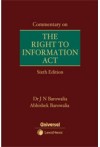- Author(s): Dr. J.N. Barowalia, Abhishek Barowalia
- Publisher: Universal LexisNexis
- Edition: 6 Ed 2024
- ISBN 13 9788119403493
- Approx. Pages 1822 + contents
- Format Hardbound
- Approx. Product Size 24 x 16 cms
- Delivery Time 3-5 working days (within Kerala & South India) (Others 7-9 days)
- Shipping Charge Extra (see Shopping Cart)
.............................................................................................................................
Description
Right to know is a basic Fundamental Right which citizens of a free country aspire in the broader horizon of the right to live in this age in our land under Article 21 of our Constitution. The people of this country have a right to know every public act. everything, that is done in a public way, by their public functionaries. They are entitled to know the particulars of every public transaction in all its bearing. The right to know, which is derived from the concept of freedom of speech, though not absolute, is a facror which should make one wary, when secrecy is claimed for transactions which can, at any rate, have no repercussion on public security. Indian Parliament enacted the Right to Information Act in 2005 and its preamble shows that the Act is to promote transparency and accountability in the working of every public authority in order to strengthen the core constitutional values of a democratic republic. It is clear that the Parliament enacted this Act keeping in mind the rights of an informed citizenry in which transparency of information is vital in curbing corruption and making the Government and its instrumentalities accountable. The object of the Act is to empower the citizens to fight against corruption and hold the Government and their instrumentalities accountable to the citizens, by providing them access to information regarding functioning of every public authority. Certain safeguards have been built into the Act so that the revelation of information will not conflict with other public interests which include efficient operation of the governments, optimum use of limited fiscal resources and preservation of confidential and sensitive information. Five editions of this book received overwhelming response from the bench, bar and all those who have to deal with this legislation and the reviews of the book published in various journals bear testimony that the book enjoyed the reputation of a standard and reliable commentary on the subject.
.............................................................................................................................
Contents
Part I : The Right to Information Act, 2005
Chapter I. Preliminary
Chapter II. Right to Information and Obligations of Public Authorities
Chapter III. The Central Information Commission
Chapter IV. The State Information Commission
Chapter V. Powers and Functions of the Information Commissions, Appeal and Penalties
Chapter VI. Miscellaneous
Part II : Rules under Right to Information Act, 2005
Part III : Other Related Laws
Part IV : Allied Acts & Rules
Part V : International Conventions & Declarations
Part VI : Reports and Guidelines
Part VII : State Laws o the Right to Information
Part VIII : Fee structure of States
Part IX : Important Notifications and Allied Informations
Part X : Specimen Forms
Appendix
Subject Index
.............................................................................................................................
Author Details
Dr. J.N. Barowalia, an eminent jurist, had a brilliant academic record and obtained his B.A. degree from Punjab University by securing first position in his college and LL.B. degree from Himachal Pradesh University in the first division. He had the distinction of having Ph.D. in Economics.Dr. Barowalia topped in the Himachal Pradesh Judicial Services Competitive Examination held in 1975 and served as Sub Judge-cum-Judicial Magistrate-cum-Rent Controller from July 1976 to June 1984; as Senior Sub Judge-cum-Chief Judicial Magistrate of Lahaul Spiti, Kangra and Mandi Districts from July 1984 to October 1994; and since April 1995 he is working in Higher Judicial Service. He had served as District and Sessions Judge, Incharge of Kullu and Lahaul Sessions Division (1997-1999), District & Sessions Judge, Incharge Una Sessions Division (1999-2001), District & Sessions Judge, Incharge Kangra Sessions Division at Dharamsala (2001-2002); President, District Consumer Forum, Shimla (2002-2003) and since June 2003 he is working as Principal Secretary to Hon'ble Chief Justice-cum-Registrar, High Court of Himachal Pradesh, Shimla. Dr. Barowalia represents that classical breed of judicial officers who are inclined to proceed beyond the limited confines of daily judicial work into the broadening experiences of multi-dimensional intellectual activity. His books titled 'Commentary on the Narcotic Drugs & Psychotropic Substances Act', 'Commentary on the Himachal Pradesh Land Revenue Act', 'Commentary on the Himachal Pradesh Panchayati Raj Act' and the 'Commentary on the Consumer Protection Act', have received overwhelming response from judges, advocates and the students of law alike. He is a guest faculty of the S.V.P. National Police Academy, Hyderabad, Institute of Public Administration, Shimla and Himachal Pradesh State Judicial Academy, Shimla. Dr. Barowalia has been called upon to deliver lectures on the subjects of land disputes and consumer protection in various seminars and workshops. He has also been invited to deliver lectures on "Drug Laws", "Management of Drug Abuse" and "Drug Abuse and AIDS" in the National and State level seminars and workshops held at Hyderabad, Shimla, Mumbai and Gauhati and is actively involved in the campaign against "Drug Abuse and AIDS" in India.
Abhishek Barowalia

